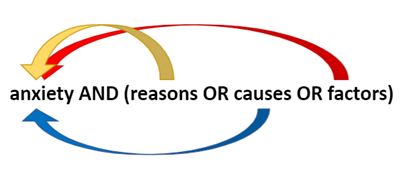Chapter 3: Search techniques
3.3 Nesting
Nesting lets you combine multiple searches into a single search. It allows you to group similar concepts or keywords together within parentheses so you don’t have to perform multiple searches. Combined with Boolean operators like AND and OR, nesting is an efficient and effective way to improve your keyword search results.
Boolean order of operations
Before we jump into how nesting works, you need to know how Boolean operators function without parentheses to group them in nests. Boolean operators follow an order of operations that determines how a finding tool will interpret your search. In a Boolean search NOT takes priority, followed by AND, and then OR. To use a combination of Booleans most effectively, you’ll want to use parentheses to make the order clear. It can be helpful to think of this like order of operations in math, where using parentheses impacts the order in which an operation is performed. By using parentheses, you control which action the finding tool you are using applies first. Here are some examples:
heavy AND metal
With this search, you may be interested in learning about heavy metals as a material, perhaps for industry production, chemistry, or the health aspects of exposure to heavy metals. However, if you just search “heavy metal,” your search will retrieve a mix of information, including resources talking about the heavy metal music genre.
heavy AND metal NOT music
By adding NOT, the index will follow the Boolean order of operations by first removing any results that contain the word “music.” This should help eliminate any references to bands or songs in the heavy metal genre. Finally, the database will search for records containing all of the remaining search terms connected by AND. But what if you have a longer list of keywords to search for?
Using nests
Let’s say you want to search for information about the causes of anxiety. After brainstorming synonyms for your keyword “causes,” you come up with “reasons” and “factors.” Databases may use different terminology to talk about the same subject. Instead of performing three separate searches for anxiety with each term, you can instead use the Boolean OR to search them all at once. Without parentheses, the search “anxiety AND reasons OR causes OR factors” would find sources containing “anxiety AND reasons,” or sources containing “causes” or “factors” without necessarily containing anything about anxiety. This will bring you way too many results, many of which will be irrelevant. To fix this search to find what you actually want, use nesting.
anxiety AND (reasons OR causes OR factors)
By combining the keywords “reasons,” “causes,” and “factors,” with OR inside the parentheses, the finding tool will first search for results containing any or all of those terms. By leaving “anxiety AND” outside of the parentheses, we are telling the finding tool that, no matter which of the three other terms it finds, “anxiety” must also be present in all of our results.

Using nested keywords lets us be more efficient by searching for all of these at the same time, rather than having to perform each search separately:
anxiety AND reasons
anxiety AND causes
anxiety AND factors
Using multiple nests
In this final example, you want to find resources discussing criticism of French cinema. Similar to the example above, using nested terms with OR lets you group related concepts to control the order in which they are searched. Because there are many ways to talk about cinema, you can connect synonyms within parentheses with OR. Similarly, you know authors may use either “French” or “France” when talking about this topic, so you create another nest with these terms.
(cinema OR movies OR film) AND (french OR france) AND criticism
The reason you don’t want to put all of the terms together with Boolean ORs in the same set of parentheses is because they are not interchangeable topics — both “France” and “cinema” are integral to our search. For this reason, we have included AND between the sets of parentheses. Boolean operators and nesting let you make your keyword search as simple or as complex as you wish. Most finding tools have features built into their advanced search to help you integrate Booleans, nesting, and more into your search process.

